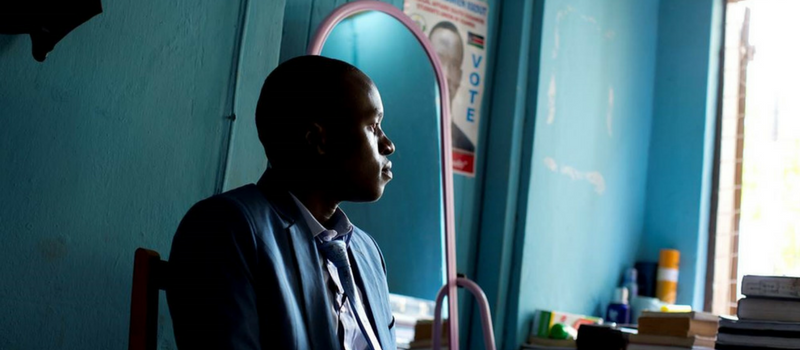Malual Bol Kiir is a 23 year old South Sudanese refugee now living in Uganda. Kiir is one of three refugee youth being honored at the WRC’s Voices of Courage luncheon on May 4, for their commitment to finding solutions for the global refugee crisis.
Kiir was forced to flee South Sudan for the first time when he was just 7 years old. “I was in a government boarding school where the teachers had guns to protect the students,” he recalls.
From 1983 through 2005, South Sudan was in the grip of one of the longest lasting civil wars on record. More than two million people died due to the war, disease, and famine, and four million were displaced because of the violence.
One of Kiir’s sisters—he has three sisters and six brothers—was sent to a Ugandan refugee camp in 2000, and he followed shortly afterwards. “I didn’t want to come to Uganda. I enjoyed the boarding school. And I had never traveled. I had never seen a plane. But my sister was there, so I had the courage to go.”
His mother and younger brother accompanied Kiir to Uganda while the remaining children stayed in South Sudan with their grandfather.
Life in the refugee camp was chaotic but interesting, says Kiir. “I met different people that I wouldn’t have met in my country,” he says. “I didn’t interact with people from different tribes in South Sudan.”
But there we challenges as well, given the influx of refugees into the country. “Ugandans had negative attitudes towards refugees. They thought we were there to take their land and opportunities,” he recalls. At even that young age, Kiir decided to start advocating and educating others. “Our work is to help them understand us. We all have one thing in common—our humanity.”
When Kiir was 14 years old, he inexplicably lost his eyesight. “I can’t properly explain what happened. It wasn’t an accident and the doctors said that nothing was wrong with my eyes.” Now blind, the avid student had to rely on others to read his school work to him. But he was determined, and persevered despite his blindness.
In 2009, the situation in South Sudan was stable and safe, so Kiir, his mother, and his two sibling returned home. “The village members were crying because they knew I had lost my eyesight,” he says. But somehow, during the following year his eyesight started to return and he slowly began to see again. “I don’t know why that happened. Maybe it was because of the tears and prayers of the villagers.”
By 2011, conflict broke out again in South Sudan, and his entire family was forced to flee to Uganda.
He entered the University in Kampala, and founded the African Youth Action Network (AYAN), and organizes peer counselling sessions, reaches out to NGOs to help to bridge the gap between Ugandan national youth and the youth from the refugee communities, and recruits other young people to work together as agents of peace and conflict prevention.
“The war in my homeland inspired me to be a peace-builder. After seeing the work we are doing, I see that youth are the ones that can bring change. It’s not the politician that will bring change but it’s the youth and our sensibilities,” he says.
Kiir participated in the WRC’s and UNHCR’s Global Refugee Youth Consultations (GRYC) that took place between October 2015 and June 2016. The GRYC brought together 1,482 young people from 23 countries to discuss their shared priorities and possible solutions.
He is also a member of the advisory panel of experts for the UN Security Council Resolution 2250 (2015) mandated progress study on youth, peace, and security, and he recently participated in designing the programmatic components for the African Union-Youth peacebuilding initiative in Addis Ababa.
He is currently in his last semester of law school, and says he decided to study law to better understand the role of government and society in general. “Since I have the background of a culture of war and want to make it a culture of peace, I thought it was important to understand some the international instruments needed to help people,” he says.
“I am going to continue with the work of advocating for peace—to change my own country and culture. I want to stop the culture of war. I know it’s a difficult path, but I know that I should continue on it.”
Kiir hopes to one day return to South Sudan and work there as an agent for peace. “South Sudan is still my county and I feel that I am the change the South Sudan seeks. I will definitely go back home and bring the change the country needs.”


